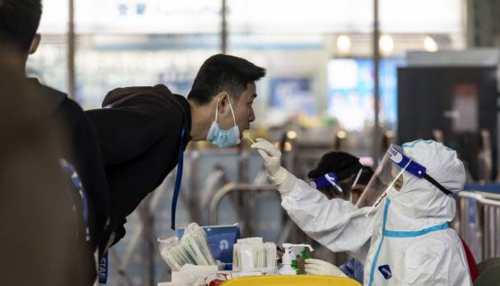- News>
- India
H3N2 virus causing spike in flu in Delhi-NCR: Expert

Spike in flu cases in Delhi-NCR: According to Dr Arjun Dang, CEO, of Dr Dang`s Lab, H3N2 Influenza cases are being reported more in comparison to H1N1 cases. He said, `Over the past few weeks, we conducted more than a few 100 tests of which a lot returned positive for H3N2. But it`s interesting to see that we are getting less positive H1N1 cases.`
New Delhi: The H3N2 virus is behind the sudden spike in cases of viral infection and respiratory infection across Delhi NCR. According to Dr Arjun Dang, CEO, Dr Dang`s Lab, H3N2 Influenza cases are being reported more in comparison to H1N1 cases. He said, "Over the past few weeks, we conducted more than a few 100 tests of which a lot returned positive for H3N2. But it`s interesting to see that we are getting less positive H1N1 cases."
Elaborating on the H3N2 virus, he said, "H3N2 virus is nothing but influenza. It`s a type of influenza A. In short, all of us know that this flu is a contagious respiratory virus that affects the nose, throat, the upper respiratory tract and in some cases, the lungs."
"There are four types of influenza viruses -- the influenza A, B, C, and D viruses. These viruses usually cause seasonal epidemics of influenza every winter, which is the so-called flu season. Influenza A viruses are further subdivided into various subtypes based on two proteins on the surfaces of the virus -- the hemagglutinin and neuraminidase." said Dr Dang.
"There are 18 different types of hemagglutinin. H1 through H18 and 11 different subtypes of neuraminidase, N1 through N 11. Currently, the subtypes of influenza A that are in circulation are H1N1 and H3N2," he added.
"It`s important to keep in mind that there are serious cases that have been documented. And also it might lead to complications such as pneumonia-like ear infections, sinus infections, among others." Dr Dang warned.
He said that it is also important to diagnose it on time so that a physician can start an anti-viral treatment. "There are multiple anti-virals that are available. And the sooner a physician starts this course of treatment, the better are the chances of getting fast relief," he said.
Highlighting the importance of understanding the method of testing the virus, he said once one develops symptoms, an RT-PCR test should be conducted. "It`s important to understand how to test for this particular virus. So once you get symptoms, the best way is to go for an RT-PCR test that has and is being used very successfully and widely for Covid diagnosis," he added.
On precautions to be taken, he said, "The same precautions that we followed for Covid so well and so successfully -- hygiene, social distancing, masking, etc -- are to be maintained to keep this virus at bay. I want everyone to understand that it is very important to get your annual flu shot or the influenza vaccine because this prevents any kind of complications or serious symptoms."
